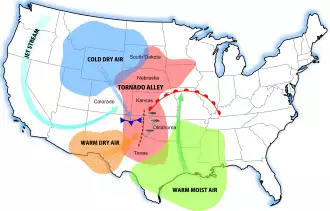cellar
A wine cellar is a storage room for wine in bottles or barrels, or more rarely in carboys [大而圆的玻璃或塑料瓶], amphorae, or plastic containers. In an active wine cellar, important factors such as temperature and humidity are maintained by a climate control system. In contrast, passive wine cellars are not climate-controlled, and are usually built underground to reduce temperature swings. An aboveground wine cellar is often called a wine room, while a small wine cellar (fewer than 500 bottles) is sometimes termed a wine closet. The household department responsible for the storage, care and service of wine in a great mediaeval house was termed the buttery. Large wine cellars date back over 3700 years. An amphora is a tall clay container for oil or wine, used in ancient times. A butler is a chief male servant of a house, usually in charge of the wine-cellar.
A root cellar (American English) or earth cellar (British English) is a structure, usually underground or partially underground, used for storage of vegetables, fruits, nuts, or other foods. Its name reflects the traditional focus on root crops [如土豆胡萝卜] stored in an underground cellar, which is still often true. A wide variety of foods can be stored for weeks to months, depending on the crop and conditions. The structure may not always be underground.
Root cellaring has been vitally important in various eras and places for winter food supply. Although present-day food distribution systems and refrigeration have rendered root cellars unnecessary for many people, they remain important for those who value self-sufficiency, whether by economic necessity or by choice and for personal satisfaction. Thus they are popular among diverse audiences, including gardeners, organic farmers, DIY fans, homesteaders, preppers, subsistence farmers, and enthusiasts of local food, slow food, heirloom plants, and traditional culture. A homestead is a farm and the area of land around it. A prepper is an individual or group that prepares or makes preparations in advance of, or prior to, any change in normal circumstances. Subsistence farming/agriculture is farming that produces just enough food for the farmer to live on, but does not produce enough food to sell to other people.
A storm shelter or storm cellar is a type of underground bunker designed to protect the occupants from violent severe weather, particularly tornadoes. They are most frequently seen in the Midwest ("Tornado Alley") and Southeastern United States ("Dixie Alley") where tornadoes are generally frequent and the low water table permits underground structures.
Tornado Alley is a loosely defined area of the central United States where tornadoes are most frequent. The term was first used in 1952 as the title of a research project to study severe weather in areas of Texas, Louisiana, Oklahoma, Kansas, South Dakota, Iowa and Nebraska. Tornado climatologists distinguish peaks in activity in certain areas and storm chasers have long recognized the Great Plains tornado belt. Climatology is the scientific study of climate.
六级/考研单词: cellar, seldom, humid, passive, subway, swing, clay, vegetation, nut, era, render, necessity, thereby, diverse, organism, subsistence, enthusiasm, norm, shelter, tornado, alley, unite

A diagram of tornado alley based on 1 tornado or more per decade. Rough location (red), and its contributing weather system




 浙公网安备 33010602011771号
浙公网安备 33010602011771号